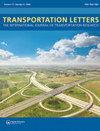Automatic activity-travel sequence generator using language, grammar, and machine theory
IF 3.3
3区 工程技术
Q2 TRANSPORTATION
Transportation Letters-The International Journal of Transportation Research
Pub Date : 2025-07-03
DOI:10.1080/19427867.2024.2416309
引用次数: 0
Abstract
Activity schedule results from a complex decision-making process characterized by several interrelated decisions. Different facets of an activity schedule such as activity type, timing, duration, etc. influence each other and this makes modeling activity schedules a complex task. This complexity has compelled researchers to explore different approaches for modeling activity schedules, among which two predominant approaches can be identified: the utility-maximization theory based econometric approach and the computational process modeling approach. Despite their advantages and a few successful practical applications, challenges still remain leaving avenues for exploration of new approaches. This paper contributes in this direction by reviewing the relationship between language, grammar, and machines in the context of sequence analysis for activity sequence generation. Following that, the paper presents a stochastic Finite State Machine that can generate activity sequences to match the frequency distribution of sequences from a given data set. Our results show that the proposed algorithm can not only generate activity sequences with a distribution similar to that of original data but can also efficiently generate new patterns not in the original data.
使用语言、语法和机器理论的自动活动旅行序列生成器
活动计划产生于一个复杂的决策过程,其特征是若干相互关联的决策。活动计划的不同方面(如活动类型、时间、持续时间等)相互影响,这使得对活动计划进行建模成为一项复杂的任务。这种复杂性迫使研究人员探索不同的活动计划建模方法,其中两种主要方法可以确定:基于效用最大化理论的计量经济学方法和计算过程建模方法。尽管它们具有优势和一些成功的实际应用,但挑战仍然存在,为探索新方法留下了道路。本文通过回顾活动序列生成的序列分析中语言、语法和机器之间的关系,为这一方向做出贡献。在此基础上,本文提出了一种随机有限状态机,它可以生成与给定数据集序列频率分布相匹配的活动序列。实验结果表明,该算法不仅可以生成与原始数据分布相似的活动序列,而且可以有效地生成原始数据中不存在的新模式。
本文章由计算机程序翻译,如有差异,请以英文原文为准。
求助全文
约1分钟内获得全文
求助全文
来源期刊

Transportation Letters-The International Journal of Transportation Research
TRANSPORTATION SCIENCE & TECHNOLOGY-
CiteScore
6.40
自引率
14.30%
发文量
79
审稿时长
>12 weeks
期刊介绍:
Transportation Letters: The International Journal of Transportation Research is a quarterly journal that publishes high-quality peer-reviewed and mini-review papers as well as technical notes and book reviews on the state-of-the-art in transportation research.
The focus of Transportation Letters is on analytical and empirical findings, methodological papers, and theoretical and conceptual insights across all areas of research. Review resource papers that merge descriptions of the state-of-the-art with innovative and new methodological, theoretical, and conceptual insights spanning all areas of transportation research are invited and of particular interest.
 求助内容:
求助内容: 应助结果提醒方式:
应助结果提醒方式:


